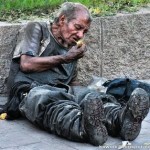– This is definitely what I think is happening. These changes have been creeping up on us so slowly that we’ve scarcely noticed their aggregation and increasing power over the years.
– Corporations (large ones, anyway) are primarily (by law) about maximizing the profits of their shareholders. At some point in their growth and increasing competitive sophistication, they realize that shaping government policies is a viable strategy for maximizing their shareholders profits – and the game is on.
– In the end, mankind will have to make a collective decision about this. Their are two schools of thought about the choice:
– One point-of-view is that the maximization of individual profit and power is the highest thing humans can aspire to and thus what corporations and extremely wealthy individuals are about is a good thing.
– The second point-of-view is that our governments, laws and societies should primarily be about maximizing the quality of life for all of the people here on the planet.
– Thus far, our species and most of our societies haven’t made a conscious choice. Indeed, I’ve seldom even seen the question/issue posed.
– But, there will come a time (it’s nearly upon us now) when the consequences of letting the power and profit obsessed (both individual and corporate) run free among us like wolves through the sheep will become blindingly obvious.
– dennis
= = = = = = = = = = = = = = = = = =
In just the last few years, the Corporate Police State has reared its head at every level of government.
“Corporate Police State,” it’s a fraught — some might even say, overwrought — term. But in its purest, apolitical form, it simply describes the periodic commingling of state and corporate power to protect private interests.
In the American psyche, any discussion of that phenomenon typically brings one of three images to mind. There’s the Old Corporate Police State — the sepia-toned America of decades long past, a place where state militiasmurder striking mine workers on behalf of Gilded Age barons and Congress empowers the government to forcibly ban work stoppages that defy corporate executives’ wishes. There’s the Fictional Future Corporate Police State — that smoldering bombed-out world depicted in “Robocop,” “Fortress” and every other dystopian flick in Hollywood’s post-apocalyptic catalog. And there’s the Foreign Corporate Police State — think Dubai, Singapore, Monaco and every other lavish enclave defined by lots of rich people, lots of corporate headquarters, lots of heavily armed cops — and almost no civil liberties.
By imagining the Corporate Police State primarily as a historical, fictional or foreign monster, these snapshots encourage us to believe that this monster poses no threat to us in the here and now. They encourage us, in other words, to ignore the monster’s creeping advances in present-day America.
In just the last few years, the Corporate Police State has reared its head at every level of government.
States and municipalities, for instance, have toughened criminal penalties and immigrationlaws at the behest of the private prison industry; empowered Wall Street banks to not only collect taxes but levy additional tax penalties; and allowed energy companies to exploit so-called forced pooling statutes, thereby creating what one Republican governor calls a new power of“private eminent domain.” One state is now even considering making it a criminal act to share your Netflix password with friends and family, because that is cutting into Netflix revenues.
In Washington, D.C., the federal government just enacted a healthcare bill whose individual mandate forces citizens to purchase private insurance, and the Pentagon has developed a reliable pattern of using military power to occupy resource-rich countries — and then to privatize those resources at the barrel of a gun.
This same government, which has granted corporations the rights of “personhood,” has also used its power to let corporations avoid the responsibilities of personhood — effectively using state power to create a new privileged status that is above the law. For instance, federal statutes have trampled the concept of “equal protection” by deliberately exempting corporate interests from the laws the rest of us live under — laws like the Safe Drinking Water Act (whichdoesn’t apply to natural gas drillers) and antitrust statutes (which still don’t apply to private health insurers). Federal courts have used judicial power to limit corporations’ legal and financial liability for fraud and lawbreaking.
– More… ➡

